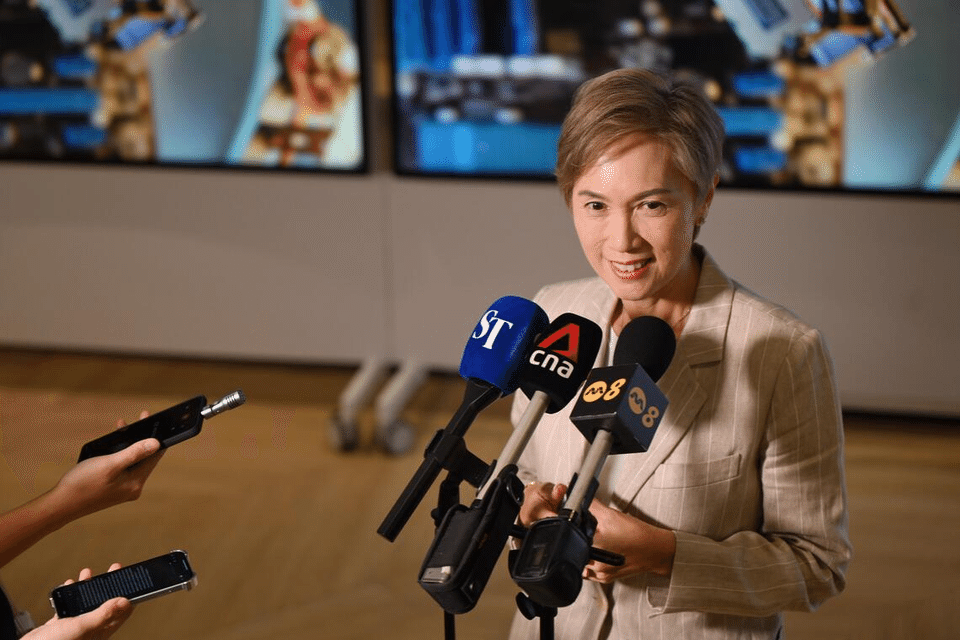AI key to boosting Singapore’s financial hub edge as Govt keeps improving guard rails: Josephine Teo

(Photo credit: ST Photo/Azmi Athni)
Source: The Straits Times
Artificial intelligence (AI) will be key to strengthening Singapore’s competitive advantage as a leading financial hub as companies here seek to serve a wider client base in a growing region.
Apart from adopting AI for work processes, this also includes continuously improving the guard rails against risks associated with the technology, said Minister for Digital Development and Information Josephine Teo at a media doorstop interview on Oct 6.
The risks can come in the form of potentially costly mistakes introduced by AI applications that make business recommendations, or biased assessments that can lead to discriminatory practices, said Mrs Teo.
“These types of risks are not unique to the use of AI in financial services, (but) what we have done in Singapore is to make companies more aware of these risks to begin with,” she added, citing governance frameworks and software toolkits that have been introduced in recent years, such as Project Moonshot.
Launched in 2024, Project Moonshot allows app developers to address safety and security challenges associated with large language models, which form the base of many generative AI-driven solutions.
Developed by the AI Verify Foundation and Infocomm Media Development Authority, it also allows businesses to test whether applications can be manipulated into “misbehaving”, such as saying anything inappropriate or producing violent content.
The Model Governance Framework for Generative AI was also introduced in the same year by the two agencies to identify areas where governance of Gen AI can be strengthened, such as transparency about where and how content is generated. It builds on an existing framework published in 2019 that covered only traditional AI.
The Government is not alone in these efforts, gathering feedback from companies that helps to continuously improve these guard rails, said Mrs Teo.
She was speaking to the media at the UBS office in Penang Road, after a closed-door tour of the bank’s AI and transformation factory that was launched in November 2024.
It has 150 employees under this new department, which consists of technical experts such as programmers, data scientists and product managers.
Mrs Teo viewed demonstrations of products currently being developed by the team, including an AI-powered tool that helps to reduce the amount of time employees spend on doing background checks on its wealth management clients, which traditionally take around two weeks.
This would help to dramatically reduce the time spent on a tedious process, said Ms Ruth Hong, who leads the design of AI initiatives such as the Know-Your-Client tool.
“I used to work in operations (at UBS), and was once part of doing that KYC (know your client) process,” said Ms Hong, who is now the product owner of agentic products at the UBS group operations and technology office. She joined the AI and transformation factory in 2024.
“Now, I have a chance to come out and leverage what we have experienced, and put that into reality for efficiency.”
Having employees who understand business processes, and not just AI specialists such as data scientists and machine learning, is also crucial to how the sector can strengthen its competitiveness, said Mrs Teo.
“They know what are the pain points, the opportunities for improvement, and they acquire enough AI skills and knowledge in order to apply them to their day-to-day activities,” she added.
“In this way, I think we can strengthen the sector’s ability to use AI, and we will continue to press on in this area.”
UBS’ factory adds to a growing list of over 50 AI centres of excellence (CoEs) that have been set up in Singapore, and this number will continue to grow across different sectors, said Mrs Teo.
She added that more than 30 financial institutions here have AI teams, with some of them setting up CoEs that develop innovative solutions to be applied in global operations.
“We see this as a very good way of showcasing the capabilities here, and to also promote the continued development of the AI ecosystem in Singapore.”
